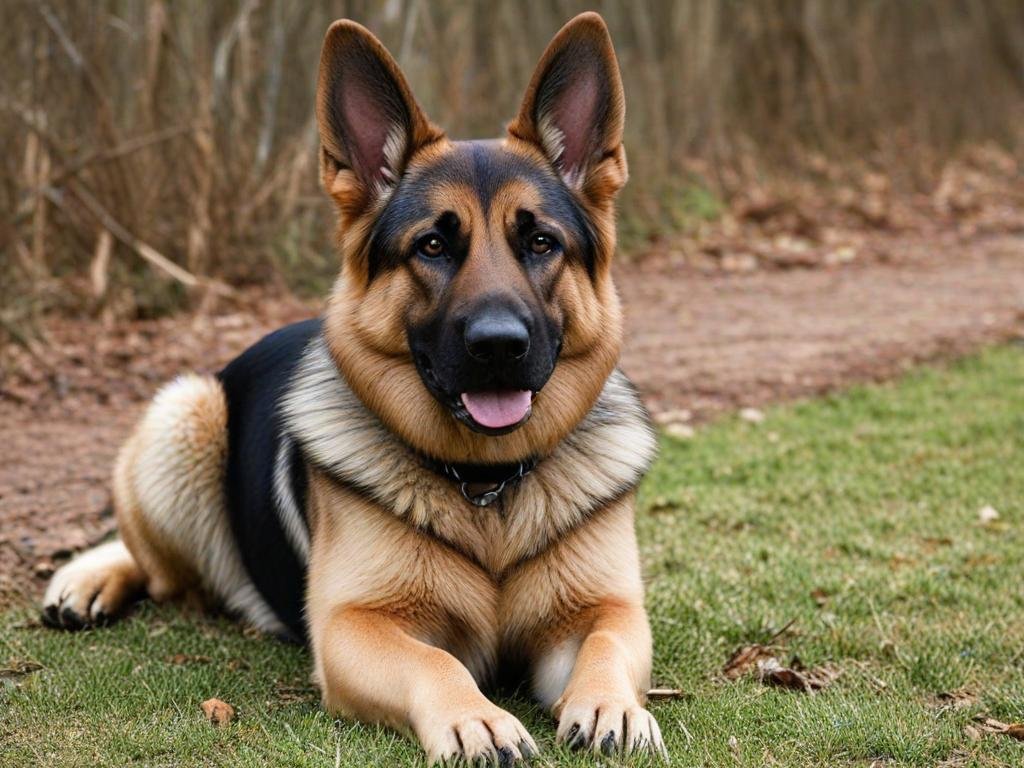The German Shepherd is one of the most recognized and respected dog breeds globally. Known for their intelligence, loyalty, and versatility, German Shepherds excel in various roles, from family pets to working dogs. This article explores the characteristics, origin, lifestyle, personality, lifespan, interesting facts, grooming needs, food habits, and care guidelines to provide a comprehensive understanding of the German Shepherd breed.
If you need vet appointment through us, please scroll to the bottom and fill up the form!
Characteristics
German Shepherds are large, strong, and athletic dogs. Males typically weigh between 65-90 pounds and stand about 24-26 inches tall at the shoulder, while females weigh between 50-70 pounds and stand about 22-24 inches tall. They have a double coat with a dense, weather-resistant outer layer and a softer undercoat. The coat colors can range from black and tan, sable, to all-black or all-white. Their ears are erect, and they have an expressive face with almond-shaped eyes.
Origin
The German Shepherd originated in Germany in the late 19th century. They were initially bred for herding and guarding sheep. Max von Stephanitz is credited with developing the breed, emphasizing intelligence, strength, and versatility. The breed gained international recognition for its abilities and was quickly adopted for police and military work, search and rescue missions, and as service dogs.
Lifestyle
German Shepherds are active and intelligent dogs that thrive in environments where they have a job or purpose. They require regular physical and mental stimulation to prevent boredom and destructive behavior. These dogs are best suited for homes with access to a yard and owners who can provide plenty of exercises and interactive activities. German Shepherds enjoy participating in dog sports, obedience training, and agility courses.
Personality
German Shepherds are known for their loyalty, courage, and confidence. They form strong bonds with their families and are protective by nature. They are also highly intelligent and trainable, often excelling in obedience and working roles. While they can be reserved with strangers, they are not typically aggressive unless provoked or their family is threatened. Early socialization and consistent training are essential to ensure they develop into well-rounded and well-behaved adults.
Lifespan
The average lifespan of a German Shepherd is around 9-13 years. With proper care, a balanced diet, regular exercise, and routine veterinary check-ups, German Shepherds can enjoy a long and healthy life.
Interesting Facts
• **Versatile Working Dogs**: German Shepherds are used in various roles, including police and military work, search and rescue, service dogs for individuals with disabilities, and therapy dogs.
• **Famous German Shepherds**: Rin Tin Tin, a German Shepherd rescued from a World War I battlefield, became a famous Hollywood movie star in the 1920s and 1930s.
• **Highly Trainable**: Their intelligence and eagerness to learn make them one of the most trainable breeds, excelling in obedience, protection, and agility training.
Grooming
German Shepherds have a double coat that requires regular grooming to keep it in good condition. They shed year-round, with heavier shedding occurring seasonally. Brushing them 2-3 times a week helps to reduce shedding and keep their coat healthy. During shedding seasons, more frequent brushing may be necessary. Regular baths, ear cleaning, nail trimming, and dental care are also important parts of their grooming routine.
Food Habits and Preferences
A balanced diet is essential to maintain the health and vitality of a German Shepherd. High-quality commercial dog food that meets their nutritional needs, appropriate for their age, size, and activity level, is recommended. German Shepherds can also benefit from a diet that includes lean meats, vegetables, and grains. Avoid overfeeding and monitor their weight to prevent obesity. Fresh water should always be available.
Guidelines for Care
1. **Exercise**: Ensure your German Shepherd gets at least 1-2 hours of exercise daily. This can include walks, playtime, training sessions, and interactive games.
2. **Training**: Consistent and positive reinforcement training is crucial. Start early with basic obedience commands and continue with advanced training to keep them mentally stimulated.
3. **Socialization**: Expose your German Shepherd to different environments, people, and other animals to help them develop confidence and reduce anxiety.
4. **Health Check-ups**: Regular veterinary visits are essential to monitor their health, keep up with vaccinations, and prevent common health issues such as hip dysplasia.
5. **Safe Environment**: Provide a secure and safe environment, whether at home or in the yard, to prevent them from wandering off or getting into dangerous situations.
In conclusion, German Shepherds are loyal, intelligent, and versatile dogs that make excellent companions and working partners. With proper care, training, and attention, they can bring joy, protection, and service to any household or community.

